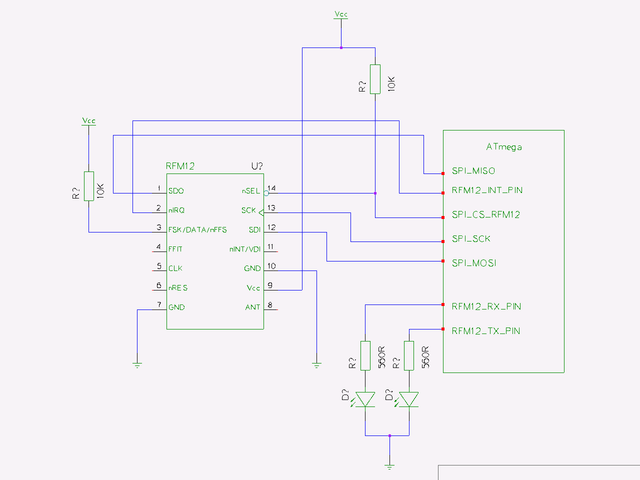Difference between revisions of "RFM12 FSK"
(→Configuration) |
|||
| (5 intermediate revisions by the same user not shown) | |||
| Line 25: | Line 25: | ||
/* port the rfm12 module CS is attached to */ | /* port the rfm12 module CS is attached to */ | ||
| − | pin( | + | pin(SPI_CS_RFM12_0, PB0, OUTPUT) |
| − | + | ||
| − | /* port the LEDS for rfm12 | + | /* port the LEDS for rfm12 tx/rx attached to */ |
pin(STATUSLED_RFM12_TX, PB3, OUTPUT) | pin(STATUSLED_RFM12_TX, PB3, OUTPUT) | ||
pin(STATUSLED_RFM12_RX, PB1, OUTPUT) | pin(STATUSLED_RFM12_RX, PB1, OUTPUT) | ||
| + | |||
| + | RFM12_USE_INT(2) | ||
| + | |||
| + | If more than one RFM12 are used with Ethersex, the number in SPI_CS_RFM12_0 defines the number of the module. | ||
| + | Each needs its own pinning. The RFM12_USE_INT defines whether nRQ is connected to INT0, INT1 or INT2 of the AVR. | ||
| − | + | == Configuration == | |
| − | + | | | Network ---> | | | |
| + | ... | ||
| + | | | [*] IP over RFM12 (FSK transmitter) support ---> | | | ||
| + | ... | ||
| + | | | (0) RFM12 select | | | ||
| + | | | (433.920MHz) RFM12 frequency | | | ||
| + | | | [ ] Use slow SPI | | | ||
| + | | | [ ] Use RFM12B | | | ||
| + | | | (19200) RFM12 Baudrate | | | ||
| + | | | IP address: "192.168.5.1" | | | ||
| + | | | Netmask: "255.255.255.0" | | | ||
| + | | | [ ] Source Route ALL packets | | | ||
| + | | | [ ] RFM12 Packet Forwarding | | | ||
| + | | | [-] RFM12 ARP-Proxy | | | ||
[[Category:RFM12]] | [[Category:RFM12]] | ||
Latest revision as of 11:48, 4 June 2013
| RFM12 FSK | |
|---|---|
| Status | Stable
|
| menuconfig | Network->IP over RFM12 (FSK transmitter) support |
| Pinning | yes |
| Ecmd | no |
| Control6 | no |
| Requires | UIP_SUPPORT |
| Code | https://github.com/ethersex/ethersex/tree/master/hardware/radio/rfm12 |
The default operating mode of the RFM12 is FSK. This mode is used to treat several Ethersex systems connect by radio with each other. Here, one of the systems can act as a router to connect to a wired network.
Connection
If you are using hardware SPI, which is the default, connect the RFM12 to the AVR as follows:
The SPI connection is pretty fixed and does not need special pinnings. For the chip select (CS) of the modul and the optional LEDs the pinning must be defined.
/* port the rfm12 module CS is attached to */ pin(SPI_CS_RFM12_0, PB0, OUTPUT) /* port the LEDS for rfm12 tx/rx attached to */ pin(STATUSLED_RFM12_TX, PB3, OUTPUT) pin(STATUSLED_RFM12_RX, PB1, OUTPUT) RFM12_USE_INT(2)
If more than one RFM12 are used with Ethersex, the number in SPI_CS_RFM12_0 defines the number of the module. Each needs its own pinning. The RFM12_USE_INT defines whether nRQ is connected to INT0, INT1 or INT2 of the AVR.
Configuration
| | Network ---> | | ... | | [*] IP over RFM12 (FSK transmitter) support ---> | | ... | | (0) RFM12 select | | | | (433.920MHz) RFM12 frequency | | | | [ ] Use slow SPI | | | | [ ] Use RFM12B | | | | (19200) RFM12 Baudrate | | | | IP address: "192.168.5.1" | | | | Netmask: "255.255.255.0" | | | | [ ] Source Route ALL packets | | | | [ ] RFM12 Packet Forwarding | | | | [-] RFM12 ARP-Proxy | |
